Related Research Articles
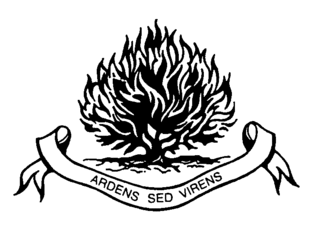
Presbyterianism is a part of the Reformed tradition within Protestantism that traces its origin to the Church of Scotland.

Philip Schaff was a Swiss-born, German-educated Protestant theologian and ecclesiastical historian, who spent most of his adult life living and teaching in the United States.

The Presbyterian Church in the United States was a Protestant denomination in the Southern and border states of the United States that existed from 1861 to 1983. That year, it merged with the United Presbyterian Church in the United States of America (UPCUSA) to form the Presbyterian Church (USA).
Greenville Presbyterian Theological Seminary is a confessional Presbyterian seminary in Taylors, South Carolina, United States. Founded in 1986, Greenville Presbyterian Theological Seminary exists to equip preachers, pastors, and churchmen for Christ's Kingdom. The school is modeled on Old Princeton Theological Seminary of the late 19th and early 20th centuries. It teaches the accuracy and doctrinal integrity of the Westminster Confession of Faith, together with the Larger and Shorter Catechisms, as adopted by the Presbyterian Church in America. It is not affiliated with a specific denomination, but graduates of the Seminary minister in denominations such as the Presbyterian Church in America (PCA), Orthodox Presbyterian Church (OPC). Associate Reformed Presbyterian Church (ARP), United Reformed Churches in North America (URCNA), Reformed Church in the United States (RCUS), Reformed Presbyterian Church, Free Church of Scotland, Evangelical Presbyterian Church in England and Wales (EPCEW), Reformed Presbyterian Church of North America (RPCNA), Igreja Presbiteriana do Brasil, Association of Reformed Baptist Churches of America (ARBCA), Reformed Baptist Network (RBN), Communion of Reformed Evangelical Churches (CREC), Bible Presbyterian Church (BPC), Presbyterian Reformed Church (PRC), and in a number of Independent congregations. The current president of the seminary is Jonathan Master, formerly the Dean of the School of Divinity at Cairn University.

Charles Hodge was a Presbyterian theologian and principal of Princeton Theological Seminary between 1851 and 1878.

Archibald Alexander Hodge, an American Presbyterian leader, was the principal of Princeton Seminary between 1878 and 1886.

Andover Theological Seminary (1807–1965) was a Congregationalist seminary founded in 1807 and originally located in Andover, Massachusetts on the campus of Phillips Academy. Andover Theological Seminary and Newton Theological Institution merged in 1965 to form the Andover Newton Theological School (1965–2018). In its original and merged forms, it was the first and thus the oldest theological seminary founded in the United States. The seminary continues as Andover Newton Seminary at Yale Divinity School launched in 2017.
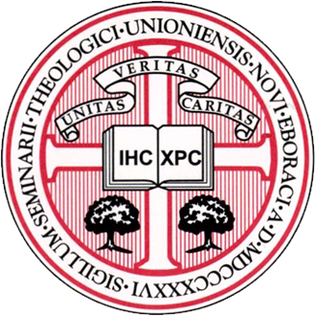
Union Theological Seminary in the City of New York (UTS) is a non-denominational Christian seminary in Morningside Heights, Manhattan, New York City. It is affiliated with neighboring Columbia University. Since 1928, the seminary has served as Columbia's constituent faculty of theology. In 1964, UTS also established an affiliation with the neighboring Jewish Theological Seminary of America.
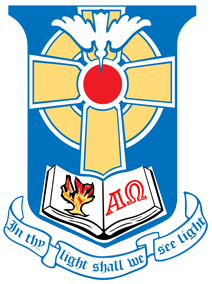
The Associate Reformed Presbyterian Church (ARPC), as it exists today, is the historical descendant of the Synod of the South, a Synod of the Associate Reformed Church. The original Associate Reformed Church resulted from a merger of the Associate Presbytery and most of the Reformed Presbytery in Philadelphia in 1782. The northern Synods eventually merged with the forebearers of the Presbyterian Church (USA). It is one of the oldest of the United States' theologically and socially conservative denominations.

Charles Augustus Briggs, American Presbyterian scholar and theologian, was born in New York City, the son of Alanson Briggs and Sarah Mead Berrian. He was excommunicated from the Presbyterian Church for heresy due to his liberal theology regarding the Bible.

The Presbyterian Church in the United States of America (PCUSA) was the first national Presbyterian denomination in the United States, existing from 1789 to 1958. In that year, the PCUSA merged with the United Presbyterian Church of North America, a denomination with roots in the Seceder and Covenanter traditions of Presbyterianism. The new church was named the United Presbyterian Church in the United States of America. It was a predecessor to the contemporary Presbyterian Church (USA).
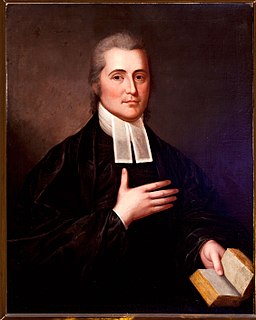
Philip Milledoler was an American Presbyterian and Dutch Reformed minister and the fifth President of Rutgers College serving from 1825 until 1840.

Francis Landey Patton was a Bermudan-American educator, Presbyterian minister, academic administrator, and theologian, and served as the twelfth president of Princeton University.
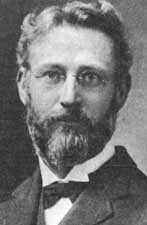
Geerhardus Johannes Vos was a Dutch-American Calvinist theologian and one of the most distinguished representatives of the Princeton Theology. He is sometimes called the father of Reformed Biblical Theology.

The Fundamentalist–Modernist controversy is a major schism that originated in the 1920s and '30s within the Presbyterian Church in the United States of America. At issue were foundational disputes about the role of Christianity, the authority of Scripture, the death, Resurrection, and atoning sacrifice of Jesus. Two broad factions within Protestantism emerged: Fundamentalists, who insisted upon the timeless validity of each doctrine of Christian orthodoxy, and Modernists, who advocated a conscious adaptation of religion in response to the new scientific discoveries and the moral pressures of the age. At first, the schism was limited to Reformed Protestantism (Calvinism) and centered about the Princeton Theological Seminary which has split into Westminster Theological Seminary, but it soon spread, affecting nearly every Protestant denomination in the United States. Denominations that were not initially affected, such as the Lutheran Church, eventually were embroiled in the controversy, leading to a schism in the Lutheran Church.

The Old School–New School Controversy was a schism of the Presbyterian Church in the United States of America which took place in 1837 and lasted for over 20 years. The Old School, led by Charles Hodge of Princeton Theological Seminary, was much more conservative theologically and did not support the revival movement. It called for traditional Calvinist orthodoxy as outlined in the Westminster standards.

James Irwin Brownson, Sr., D.D. was a clergyman and academic in Washington, Pennsylvania. He served as pastor of the First Presbyterian Church of Washington, Pennsylvania for over 50 years.
James Oliver Buswell, Jr. was a fundamentalist Presbyterian educator and institution builder.
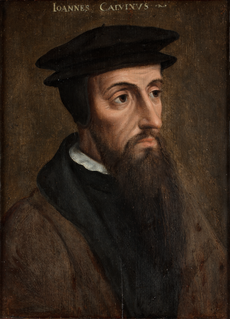
Presbyterianism has had a presence in the United States since colonial times and has exerted an important influence over broader American religion and culture.
John Mcclellan Holmes was a Christian minister and author.
References
- 1 2 Appletons' Cyclopædia of American Biography : MATHEWS, James McFarlane.
- ↑ Scouller, James B. Manual of the United Presbyterian Church of North America 1751-1881. Harrisburg: Patriot, 1881, 444-445.